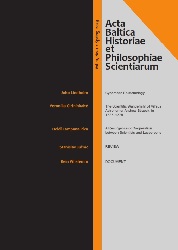Cybernetic Epistemology
Cybernetic Epistemology
Author(s): Juho LindholmSubject(s): Epistemology, Contemporary Philosophy, Pragmatism, Philosophy of Science, ICT Information and Communications Technologies
Published by: Tallinna Tehnikaülikooli õiguse instituut
Keywords: categories; Charles S. Peirce; cybernetics; Eino Kaila; epistemology; experience; invariance; John Dewey; meaning; pragmatism;
Summary/Abstract: Mainstream analytic epistemology conceives knowledge as representation: as true justified (un-Gettiered) belief. Such representation is conceived as independent of practice, its justification to consist in experience, and experience as mere observation. Such notion of experience is too narrow to take the epistemic value of experimentation into account. But science is emphatically experimental. On the other hand, John Dewey defined experience as organism–environment interaction. Such interaction is bidirectional and hence experimental by nature. It involves feedback. Cybernetics studies feedback systems. Hence, cybernetic epistemology is a consequence of Dewey’s definition. Cybernetic epistemology maintains that knowledge is practice, that is, an (approximately and relatively) invariant pattern of potential organism–environment interaction, rather than something independent of practice. In this article, I will make a case for cybernetic epistemology. It seems to dispense with the representational notion of knowledge and to provide an original justification for process ontology.
Journal: Acta Baltica Historiae et Philosophiae Scientiarum
- Issue Year: 11/2023
- Issue No: 1
- Page Range: 3-51
- Page Count: 49
- Language: English

